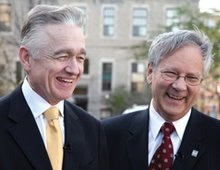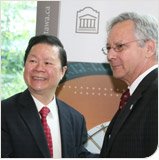 [Photo: Marc Kelly through the window of the SFUO-SAC office just before Ottawa Police barged in to arrest him.]
[Photo: Marc Kelly through the window of the SFUO-SAC office just before Ottawa Police barged in to arrest him.]OTTAWA, December 14, 2010: Marc Kelly court decision released - victory for students and for student sovereignty over student space.
The February 2, 2010, campus arrests of mathematics-physics student Marc Kelly and student union president Seamus Wolfe at the University of Ottawa were depicted in two popular Youtube videos (HERE, HERE) and were reported in the national media HERE.
(The videos were made by student University Senate member Joseph Hickey.)
By using a student union lawyer to bargain for diversion (community service), Wolfe effectively admitted guilt to the false-arrest charge of "disturbing the peace by swearing" for saying "fuck face" under his breath to the Ottawa Police sergeant on the scene (Sgt. Mallet) who had overseen the false-arrest of Kelly.
Kelly pleaded not guilty, went to trial self-represented against the Crown, the cops, the University, and University Legal Counsel Alain Roussy who attended the entire trial, and won in a precedent-setting ruling released today by judge L. Girault at the Provincial Offenses Court in Ottawa, Ontario.The charge was trespass despite the fact that Kelly was in the Student Appeal Centre (SAC) office of the student union consulting on the University's illegitimate trespass order against him.
The scholarship student had previously been unilaterally de-registered from his study program and exiled from campus without justification (HERE) by a vindictive administration that did not take kindly to Kelly's well known (and TV-broadcast) direct appeal to president Allan Rock, revealing Rock to be verbally abusive (HERE).
The ruling establishes what should have been obvious to Roussy (or co-Counsel Kathryn Prud'homme, who informed the police otherwise) that the student union, the Student Federation University of Ottawa (SFUO), not the University is the legal occupier of SFUO offices.
Indeed, Roussy and Prud'homme were in the possession of an agreement between the SFUO and the University of Ottawa, signed at the highest university level (VP-Resources), which explicitly stated that the SFUO was the legal occupier. (Arguably the SFUO still owns the University Centre!)
The main part of the trial had been held on December 2, 2010, where an impressive array of large men and women in and out of bullet proof vests testified or were present to testify against Kelly:
- Claude Giroux, campus police chief
- D. Levesque, Ottawa Police
- Nicholas Lavoie, campus police
- Ryan Macdonald, campus police
- Alexander Macpherson, campus police
- Brian Vissers, spy camera coordinator, university
- Nathalie Charlebois, lead investigator, campus police
- Sgt. Mallet, Ottawa Police (not present on Dec.2nd)
Lalonde had spotted Kelly in the SAC office on February 2nd and, apparently recognizing the significant and immediate danger to the institution, had called campus security presumably in a panic.
The behaviours of Roussy/Prud'homme and Lalonde were unprofessional but so was that of Ottawa Police.
The Ottawa Police consulted only Roussy/Prud'homme and disregarded the the clear and repeated legal occupancy information provided to them by SAC Director Mireille Gervais (a law graduate), SFUO President Seamus Wolfe and teacher assistant union (CUPE Local 2626) President Sean Kelly (see video). Ottawa Police then told the SFUO president they would wait for him to produce the rental contract of the office space and then five minutes later (see video) forced their way into the SAC office without a warrant and arrested Kelly.
After that, you wonder why they didn't also knee him in the thigh repeatedly and strip search him?
In addition, Constable D. Levesque of Ottawa Police blatantly lied under oath at the December 2nd trial hearing. He said he had an excellent memory of the events and that he had most definitely watched the Youtube video but that he himself had not asked for the rental contract (see 54 seconds into the video when he clearly asks Wolfe for the rental contract). Levesque added that if he had received the contract he would have reconsidered the arrest but that he had already waited (he inferred from his notes) approximately 29 minutes (see video, less than 5 minutes passed between asking for the contract and the decision to arrest). One wonders what Constable Levesque's testimony would be like if he did not have an "excellent" memory additionally supported by an unedited Youtube video that he watched?
At trial Judge L. Girault refused to look at the video that Kelly repeatedly asked to show to the court and that would have established the many improper actions of the police and Levesque's perjury.
If judges don't show initiative in examining police behaviour then students on campuses will continue to be mistreated by Ottawa's finest only too happy to serve the Rock administration.
Nonetheless, Kelly's closing arguments (delivered after he was arrested in court at lunch recess on December 2nd on unrelated charges of failing to appear in court!) were sharp and legalistic, leaving the court little room to find him guilty.
This case is precedent setting: The SFUO is the legal occupier of its premises. You can thank Marc Kelly.






